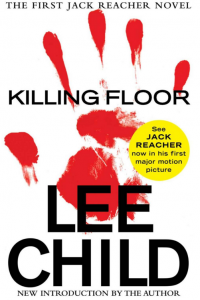 Jack Reacher. I don’t figure you need me to explain who Jack Reacher is at this point. If nothing else you’ve probably seen Tom Cruise play him in the movie. Which I liked pretty well, despite the fact that Cruise isn’t close to Reacher’s 6 foot 5 inches and that Cruise brought a somewhat sanitized version of Reacher to the screen. He might have claimed that his character didn’t worry about niceties like rules when it came to self-defense, but once you’ve actually read the book you’ll see that he was pulling his punches compared to the literary version.
Jack Reacher. I don’t figure you need me to explain who Jack Reacher is at this point. If nothing else you’ve probably seen Tom Cruise play him in the movie. Which I liked pretty well, despite the fact that Cruise isn’t close to Reacher’s 6 foot 5 inches and that Cruise brought a somewhat sanitized version of Reacher to the screen. He might have claimed that his character didn’t worry about niceties like rules when it came to self-defense, but once you’ve actually read the book you’ll see that he was pulling his punches compared to the literary version.
Killing Floor was Lee Child’s first Jack Reacher story, and it was a terrific debut novel 18 years ago. Having just read it again I’m happy to report that it’s just as good today.
Former military brat turned army officer Jack Reacher finds himself at loose ends thanks to the de-escalation of tensions as the cold war got lukewarm following the tearing down of the Berlin wall. A rolling stone all his life, Reacher had first moved from base to base as a dependent, then made many of the same moves as a member of the military, where he wound up as a homicide investigator.
Following his honorable discharge, Jack decided to avoid ties, literal or figurative, living an anonymous life on the road, or more often, paying cash for a bus to somewhere down the line.
Looking over the shoulder of a man on a bus through Georgia, Jack recognizes a town his brother had talked about, Margrove, where a black Blues musician had lived and probably died years ago. On a whim he gets off the bus and walks the long road to town…just in time to get picked up for murder because he’s convenient and not from around those parts. Classically, the local police have picked the worst possible candidate for fall guy in the world, and not just because he’s got a solid alibi. The sole detective in the immaculate southern town, Finlay, is a black guy down from Boston where he’d already had one career as a detective, but needed a new start.
Due to the emotional apocalypse that his life and Boston had become, when Finlay showed up for interview he knew he pretty much came off as a drooling idiot. So he was really surprised when he got the job. What he didn’t know was that there were looking for a drooling idiot. But they didn’t know was that he was actually a damn good detective.
So when Reacher is brought in and the facts don’t line up, and that’s a problem for everyone who’s in on the conspiracy behind the killing. Soon they’re faced with a smart detective, a smarter Jack Reacher, and Roscoe, the equally smart and sexy looking female cop who taken a shine to our boy. Of course, Jack would be happy to walk away from the whole mess until suddenly it turns out that that’s not an option for him. Not an option at all.
If there’s a weakness in Killing Floor it’s the degree to which coincidence plays a hand. I think Childs would have done well to connect the dots a bit more so that what appears to be coincidence turns out to have been anything but…which wouldn’t have taken more than a line or two…but that’s a minor quibble because even in Child’s debut novel the writing is extraordinary.
It’s written in classically noir first person, and the fun is divided in equal parts, one from the action the other from watching Reacher’s mind at work. A lot of people die, but you get the sense that it’s going to be that way from the start, and you’re forewarned that Jack isn’t the sticking around sort…especially since we have the benefit of hindsight…so even though the extras are pretty engaging characters, the fact that they might not make it to the end of the book doesn’t have as much impact as it might. That’s not a criticism of the author, it’s a natural consequence of the character he’s conjured up, a man who’s a study in alienation.
This edition has a considerable forward by the author in which he talks about creating the character, including how he came up with the name while reaching for something on a super market shelf, and how Jack differs (and resembles) other knight errants in fiction. For one thing, though he’s often up against pretty bad odds, he’s not cut from the standard down on his luck hero. Reacher dominates situations from the start and his understanding of the mechanics of crisis and his refusal to be forced into a reactive posture make his acts reasoned and deliberate, bordering on coldly dispassionate.
Fortunately, there’s plenty of passion in Jack, and despite his aloneness, he’s always interested in the people around him. It’s an interest born of curiosity though, not one of need.